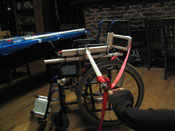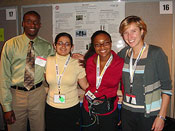Team with Stanford students on projects
that benefit people with disabilities
In the Stanford course, Perspectives in Assistive Technology, students learn about assistive technology from experts in the field and work in teams along with project partners, coaches, and individuals with disabilities to identify needs, develop designs, and build, test, and refine prototype assistive technology devices.
The course is looking for individuals to team with students working on projects that address the needs of individuals with disabilities. Your expertise, involvement, and good project ideas are needed for this mechanical engineering class that starts in January. Please let me know if you are interested in helping a student team.
Previous years' projects have been:
    |
If you have ideas for projects for this year's course, please send them to me. Project ideas must be simple enough to be completed in 10 weeks. The students will have backgrounds in mechanical engineering and some may also have considerable computer hardware and software experience. The cost of parts must be modest. Projects must address needs for which there are no commercially available products. I am also seeking funding for these projects. If you are a health care professional, a person with a disability, or otherwise interested in participating in some way, please contact me. The greater Stanford community is welcome to attend class lectures and student presentations on Tuesday and Thursday afternoons. For more information about the course, browse to the course homepage or to the webpage with project ideas, users / coaches, and support.
|